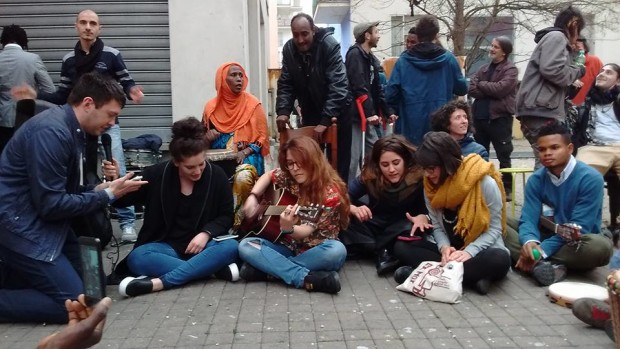
Volunteers and refugees celebrated the third anniversary of living together in the Olympic Village in Turin, Italy on April 3, 2016. (Brahim Kalie)
TURIN – Brahim Kalie (per his request, this source is identified by his pseudonym), a 34-year-old Guinean now living in a makeshift refugee camp in this northern Italian city, was working in Libya when civil war broke out in 2011. Unwilling to fight for either side in the war, he took what he saw as the only other option open to him: jump on the boat leaving for Europe.
Kalie remembered the three-day-long journey in the treacherous water like it was yesterday. He recounted in French during an interview: “We left Tripoli on May 26, 2011 at 4 a.m. and arrived at Lampedusa on May 29, 2011 at 6 a.m.”
Lampedusa is a tiny Mediterranean island off the coast of Italy. During the Libyan conflict it became a gateway for North Africans to enter Europe.
In the five years since the start of the Libyan war, bloodshed, violence and atrocities committed by the Libyan government as well as different local military forces have taken a toll on the region and ripped through the lives of everyday civilians.
Five years later, the conflict between rival forces are still ongoing, and so are the misery and pain the conflict has imposed on people, like Kalie, who had built their lives in Libya.
Kalie is one of dozens of African refugees who have found temporary refuge at the Olympic Village built for the athletes who participated in the 2006 Winter Olympics. The abandoned complex became an impromptu refugee center. Many of the residents were in Libya traveling and working when the war broke out. In the heat of the moment, they were forced to leave Libya faced with the choice to either flee to Italy – the only open border at the time – or fight for Muammar Qaddafi, the then-Libyan military dictator.
Many of these refugees would face an overwhelming amount of problems including economic difficulties, language barriers and even blatant racism after they are sent to the Italian mainland upon finishing their registration and fingerprinting process. But those who could make it to the island are considered lucky. During the perilous crossing from Libya to Lampedusa, hundreds of people including children have died, some of them drowned in the deep water, others washed ashore.
The desperation seeping out of the humanitarian crisis was so severe that Pope Francis made Lampedusa his first official visit outside of Rome back in 2013. However, three years later, despite the Pope’s continued calls for compassion and help for the refugees, the crisis persists.
Garba Osman, 32, originally from Niger, was only traveling in Libya when the war broke out, the next thing he knew he was being put on a boat and sent to Italy. “I have families in Niger, my mother and a small brother, I always think of them,” added Osman in French with a frown. “I don’t have families here. I feel alone here.”
Emotional toil is only a small fraction of the problems faced by refugees, unemployment and lack of governmental recognition have left many of them feeling desperate.
Even as Italy allowed refugees like Kalie and Osman to stay in the country, the government didn’t offer them any accommodation or support. In a moment of desperation, these and other refugees heard about the Olympic Village. The camp has been run by young Italian volunteers who saw the humanitarian crisis as their own responsibility. Most of them are young students who help the refugees with “our curriculum vitae, accompany us to the hospital and help us renew our residence permit” according to Kalie.
But there are limits to how much the volunteers can help. After 5 years of unemployment in Italy, Kalie feels like he has been idling his life way: “Here, without a job, you don’t have dignity. It’s just too difficult for us to keep living in this condition.”
In early April, the refugees at the Olympic Village marked the third anniversary of living together in this relatively safe space against the backdrop of the refugee crisis. But Kalie and many other migrants feel like nothing has changed. For them, life has not been moving ahead since they entered Italian mainland.
In a recent interview via Facebook, Kalie still expressed some hope, especially on hearing about Pope Francis’ recent gesture of bringing 12 refugees from the Greek island of Lesbos back to the Vatican. “This is a good thing,” he said. “If only all the people in power had acted like him, we would not have ended up where we are today.”